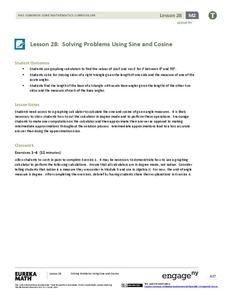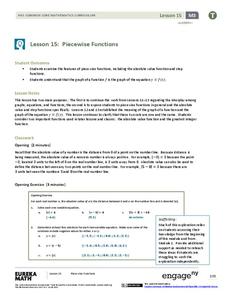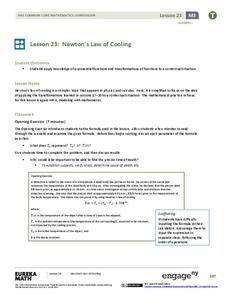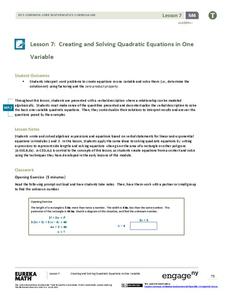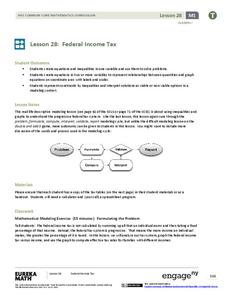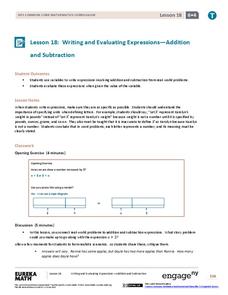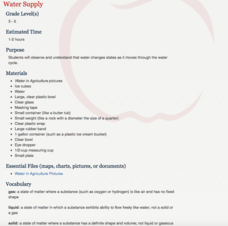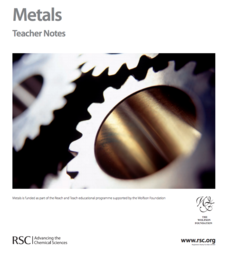Code.org
Encoding Numbers in the Real World
Ah, the numerous number of numbers. Individuals research different ways of encoding numbers. After conducting their initial research, they find classmates who have researched a different article and the pair share information. The lesson...
EngageNY
Modeling with Quadratic Functions (part 1)
Relevance is key! The resource applies quadratic modeling by incorporating application of physics and business. Pupils work through scenarios of projectile motion and revenue/profit relationships. By using the key features of the graph,...
Purdue University
Sun Tracking System for a Solar Panel
Capture the Sun's rays as best as possible. An engaging STEM lesson plan teaches scholars about how Earth's tilt causes the path of the sun to change throughout the year. They create solar panel systems that move both horizontally and...
EngageNY
Algebraic Expressions—The Commutative and Associative Properties
Who says math is boring? Turn dry concepts like properties and vocabulary into an interesting lesson! Examine the commutative and associative properties of addition and multiplication using geometric reinforcement. Through collaboration,...
EngageNY
Similarity
Learn similarity through a transformations lens! Individuals examine the effects of transformations and analyze the properties of similarity, and conclude that any image that can be created through transformations is similar. The...
EngageNY
Solving Problems Using Sine and Cosine
Concepts are only valuable if they are applicable. An informative resource uses concepts developed in lessons 26 and 27 in a 36-part series. Scholars write equations and solve for missing side lengths for given right triangles. When...
EngageNY
Perimeter and Area of Triangles in the Cartesian Plane
Pupils figure out how to be resourceful when tasked with finding the area of a triangle knowing nothing but its endpoints. Beginning by exploring and decomposing a triangle, learners find the perimeter and area of a triangle. They then...
EngageNY
Piecewise Functions
Show your class members that if they can graph a linear function, they can graph an absolute value function. Groups create an absolute value graph using a table, then entertain the idea of an absolute value function defined as two pieces...
EngageNY
Four Interesting Transformations of Functions (Part 1)
Understanding how functions transform is a key concept in mathematics. This introductory lesson makes a strong connection between the function, table, and graph when exploring transformations. While the resource uses absolute value...
EngageNY
Comparing Linear and Exponential Models Again
Making connections between a function, table, graph, and context is an essential skill in mathematics. Focused on comparing linear and exponential relationships in all these aspects, this resource equips pupils to recognize and interpret...
EngageNY
Newton’s Law of Cooling
As part of an investigation of transformations of exponential functions, class members use Newton's Law of Cooling as an exponential model to determine temperature based on varying aspects. The resource makes comparisons between models...
EngageNY
Creating and Solving Quadratic Equations in One Variable
Give your classes practice at modeling using quadratic models with a resource that uses area and integer problems to allow individuals to create second degree polynomials. Young mathematicians solve equations using factoring and then...
EngageNY
Solving Quadratic Equations by Completing the Square
Many learners find completing the square the preferred approach to solving quadratic equations. Class members combine their skills of using square roots to solve quadratics and completing the square. The resource incorporates a variety...
EngageNY
Applications of Systems of Equations and Inequalities
Is the application of systems of equations giving your class headaches? Use this resource to build on your pupils' logic to lead them to building equations and using algebraic methods. The instructional activity begins with an...
EngageNY
Federal Income Tax
Introduce your class to the federal tax system through an algebraic lens. This resource asks pupils to examine the variable structure of the tax system based on income. Young accountants use equations, expressions, and inequalities to...
EngageNY
Writing and Evaluating Expressions—Addition and Subtraction
Let Y represent Yes to using an excellent resource. Pupils first learn to define variables using a complete description in the 19th part in a series of 36. They write expressions involving addition and subtraction in real-world contexts...
National Institute of Food and Agriculture
Water Supply
Participate in three activities that look at the earth's limited water supply and the changes water goes through as it enters each phase of the water cycle. The resource is complete with three activities that demonstrate the changing...
Royal Society of Chemistry
Metals—Gifted and Talented Chemistry
Malleable, magnetic, mesmerizing metals! Pupils love learning about metallic elements, especially through the hands-on activities in an engaging lesson plan. The resource provides thorough instruction on the properties of metals, the...
State of Victoria Department of Education and Early Childhood Development
The Long Wall of China
While some aspects of the Great Wall of China are known, other parts of its story are obscured by time. A research lesson asks scholars to consider what we know and don't understand about this wonder of the world. The class then compiles...
Howard Hughes Medical Institute
Viral DNA Integration
How do viruses hijack our cells to produce more viral particles? Junior immunologists model how viral RNA integrates into a host cell's DNA using pop beads and use interactive tools to explore a virus' genome. The teacher's guide...
Curated OER
Anti-Semitism Workshop
Originating from the Yad Vashem Holocaust Memorial Museum in Jerusalem, here is a resource to support your world historians in their study of World War II, the Holocaust, your cultural scholars learning about anti-semitism, or your...
Science Friday
Ugh, a Bug!
Young entomologists familiarize themselves with the physical characteristics of insects. Composed of two activities, each instructional activity involves your scientists tapping into their prior knowledge of bugs and making observations...
Institute of Electrical and Electronics Engineers
Water Rocket Launch
How do rockets fly? Teams design, build, and launch a rocket made from a two-liter bottle to explore forces on a rocket such as Newton's Laws of Motion. During the design phase, young engineers draw a diagram of their rocket and include...
Exploratorium
Motor Effect
The magnetic wire. Class members create a magnetic field by running electricity through a wire. The video included in the resource provides information on how this effect is used to make electrical motors.
Other popular searches
- Substitute Teacher Resources
- Science Teacher Resources
- Teacher Resources Tenses
- Math Teacher Resources
- Esl Teacher Resources
- Computer Teacher Resources
- Teacher Resources Visual Art
- Download Teacher Resources
- French Teacher Resources
- Teacher Resources Rating=3
- Math Teacher Resources K12
- Free Esl Teacher Resources







